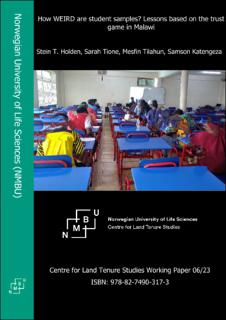| dc.description.abstract | We have used the standard trust game on a random sample of university students (N=764) and a random sample of rural residents (N=834) in Malawi. The study identifies social preference types (Bauer, Chytilov´a, & Pertold-Gebicka, 2014; Fehr, Gl¨atzle-R¨utzler, & Sutter, 2013) and how these relate to variations in trust and trustworthiness based on the standard trust game (Berg, Dickhaut, & McCabe, 1995). The games are framed as within-class and within-university for students and as within-village and within-district for the rural sample. Many previous studies have found students to represent a lower bound in experimental studies of pro-social, trust, and trustworthiness behavior compared to broader population samples. Contrary to this, we found that trust and trustworthiness were significantly higher among university students than among villagers in rural communities in Malawi. We decomposed the trust and trustworthiness to investigate the relative importance of alternative explanations for their variation and to explain the unexpected gap in trust and trustworthiness between the student and rural samples. We were able to explain most of the gap for trustworthiness and about half of the gap for trust. Factors contributing significantly to the variation in trustworthiness were social preference type, reciprocity norm, age, and gender. Trust and trustworthiness varied systematically across social preference types. Altruistic and egalitarian types were more common among the students than in the rural population, and the students also demonstrated stronger moral obligations to reciprocate in the game. On average, students and rural respondents were too optimistic about the expected returns in the trust game; students were more optimistic than rural subjects on average, and expectations influenced trust investments. Risk tolerance also enhanced trust investments; students were slightly more risk tolerant than rural subjects. Women were found to be less trusting and less trustworthy than men, and there was a larger share of women in the rural sample. There were only modest gains in trust and trustworthiness in the within-class vs. within-university and the within-village vs. within-district frames. | en_US |

